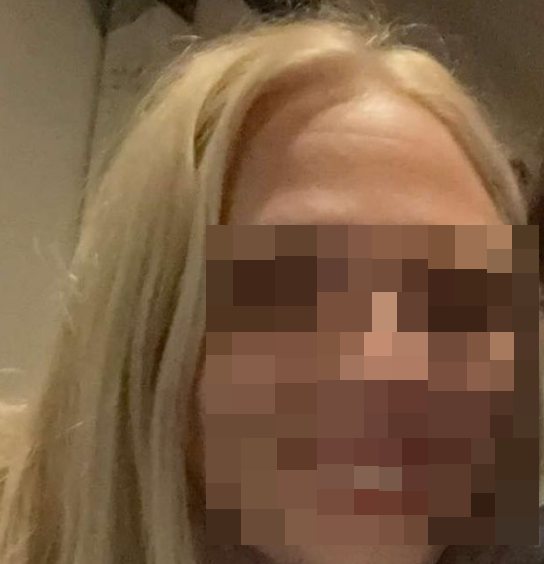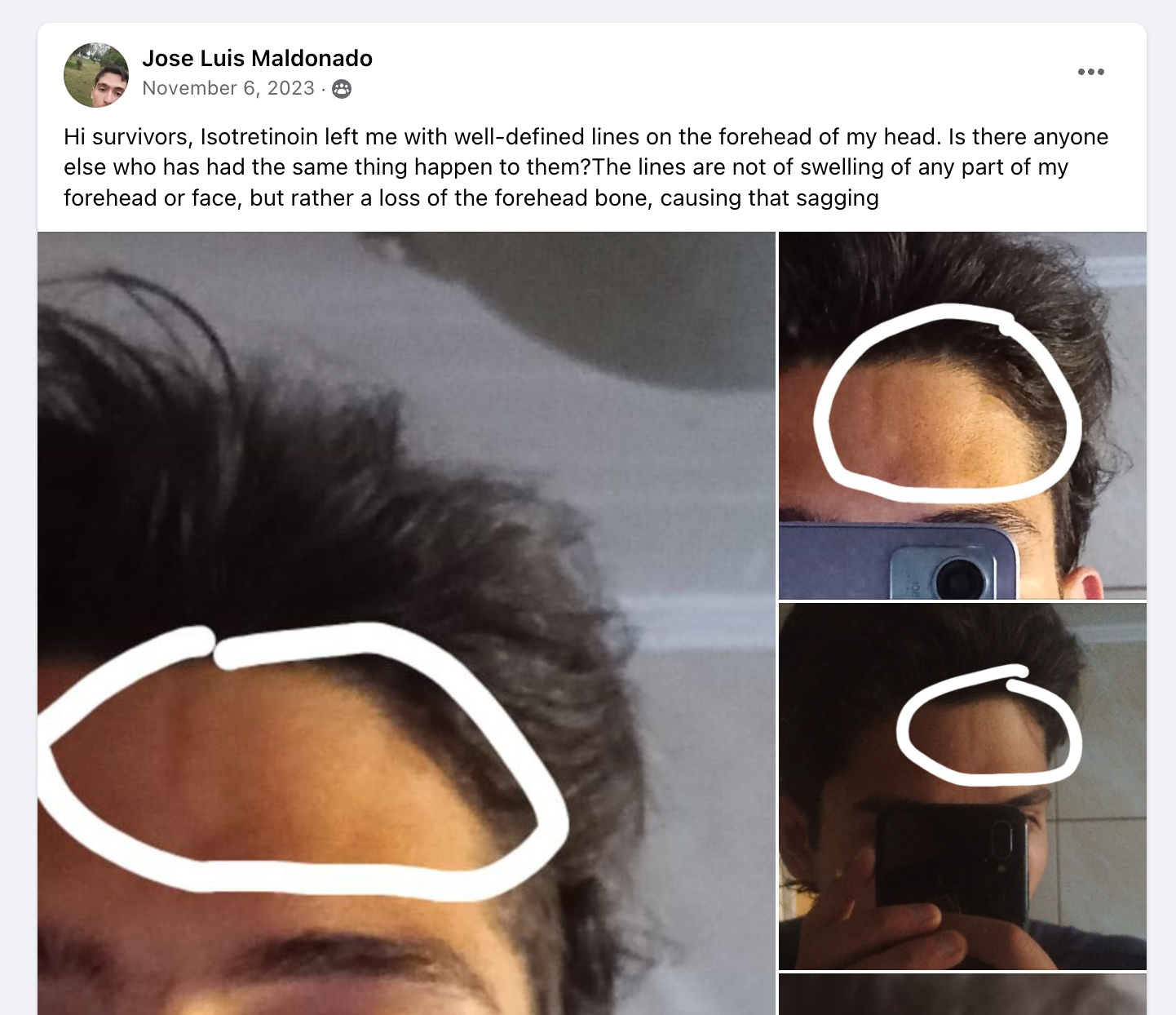Effects
The effects are basically the same as aging because retinoic acid kills cells indiscriminately like chemo.
There’s a lot of them, and a lot of unexpected ones because it destroys your body at all levels very quickly. Rather than attempting to improve one symptom (such as minoxidil for hair loss), it is necessary to increase the health of the body as a whole to address everything.
There’s no reason to treat acne with something as severe as isotretinoin because it’ll benefit you to have oiler skin later in life. Aging comes with dry skin, which is a terrible feeling. Plus, isotretinoin itself causes aging.
What does aging look like?
Everyone thinks the issue with aging is wrinkles and saggy skin, so they try to fix it with things that tighten the skin or facelifts, but in reality it’s more nuanced. Take a closer look at other people to try and really get a feel for it.
I’d say these are the main features:
- Hair becomes thinner, rougher, and coarser, so people cut it shorter
- Skin becomes dryer
- Tendons more visible
- Veins less smooth
- Skin becomes thinner
- Ears bigger
- Flesh is less “coherent,” less attached to the body overall (not just saggy)
- Inability to tan
- Low body temperature and metabolism
- Arthritis causes joints to become bent improperly
- Losing teeth (and any tooth extractions) cause jaw shape to become malformed as bone loss sets in over time
Example of good health

Contrasting aging with youth

Contrasting old veins and skin with youth


Direct damages from isotretinoin
Well-known ones
- Dry skin
- Dry lips
- Nosebleed
Uncommon but True
- Cuticle recession
- The reason this is important is because your state of health depends on how quickly your cells divide. If you have a high metabolism and lots of quickly growing cells, then your cuticles don’t dry up or recede.
- Gum recession
- Bone loss
- Thin skin and a weird line on your forehead or face
- It messes up bone/calcium metabolism. It could be resorption or some sort of pitting.


Less known but obvious in retrospect, can set in months after
- Hair loss
- Isotretinoin concentrates in the sebaceous glands, also killing your hair follicles
- Dry eyes
- Same reason as above. Stored in liver, so it’ll come out at some point, often through your oil glands including those in your eyes.
Also chronic and less known
- Tinnitus
- Probably curable with better health. This thread by /u/bitcoinspoon gives me hope. He went inactive and was eating a large amount of calories on carnivore. I can’t do carnivore/animal fats as easily due to isotretinoin release in bile.
- Reduced night vision
- Visual snow
- The above 3 can all be explained by cells in the sensory organs being killed off
- Depression
- Nightmares
- Kidney damage (Tested using Cystatin-C and creatinine methods)
- This post is so sad. A young girl was destroyed by isotretinoin as her dad didn’t want to take it and was in self-denial.
- Bone spurs (One roommate in college had a hip replacement. I think it was because of the isotretinoin he took but he doesn’t realize it).
- Nasal and mucal calcifications (I have this spot near my right ear that likely calcified, probaly somewhere along the eustachian tube, causing a fluttering sound whenever I touched the side of my head there. Over the past years, it has become less. The lymph node behind the ear is a bit large, signaling that this debris is likely being carried away.) X-ray confirms that inside my maxillary sinuses, there are calcifications. Cells take on calcium when stressed.
- Large ears (metabolic aging)
- Note. Ears also become bigger upon exposure to sunlight and retinoids concentrate in the skin, likely promoting further cellular damage.
- Inability to tan easily
- Retinoids concentrate in the melanocytes, causing skin bleaching
- Thin skin
- Retinoids thin epithelial tissue.
- Weird/dry skin
- There’s a weird thin/dry skin texture that I think unhealthy versus healthy people have, where healthy people have a certain softness to them.
- Intestinal dysbiosis
Why does isotretinoin work?
The body naturally gets rid of fat-soluble toxins through the sebaceous glands. Since it’s literally poison, it kills your oil glands on the way out.
I discovered that upon eating spicy food or spices such as black pepper, I would have hair and face itching. This is not replicated when I go into a sauna, meaning it is not heat related but likely the physical capsaicin making me feel itchy. Other people I asked do not feel this. I think the epithelial tissue all over my body is thinned, so I may just feel it more and be more susceptible to spices.
This also explains why people get dry eyes after isotretinoin, as the retinoids are excreted out through the meibomian glands over time as the body tries to get rid of retinoids.
Retinoids are poison and hence undergo degradation in the Cytochrome P450 pathway. I’m not super familiar with the detox process, but the conjugation of retinoids with taurine to inactivate it and excretion in the bile strongly support this hypothesis. Retinoids are excreted through the sebaceous glands, destroying them in the process, which is why acne is reduced.
I once met someone who had skin bleaching on his brow (ethnicity Chinese, so that area tends to be oily). I asked him if he took multivitamins which contain Vitamin A, and he confirmed that he had for a long time. Retinoids are known to bleach skin, supporting this theory.
Eczema has been cured using a low Vitamin A diet. I personally had a few bouts eczema when autoimmune/SIBO symptoms were likely causing displacement of retinoids from my liver. This girl on YouTube got totally destroyed by isotretinoin but doesn’t seem to admit reality. It’s sad, like clinging onto false hopes like in cancer remission blogs. I get itching on my skin whenever I eat any foods with Vitamin A in it–which in the USA is almost everything. She also got eczema on her hands during isotretinoin.
I don’t have cohesive scientific proof yet, so apologies if you are a scientist and reading these statements I am making as definitive. If you’d like to support research in this work or know someone who can, please contact me. I applied for a few fellowships but there were no takers.
How to detox?
It’s stored in your liver. The cursory Google “science” search says that it’s metabolized, but studies of retinoic acid from the 1950s and 1960s seem to disprove this, as they measured retinoid levels in the liver of rats. I’ll find it and post it here when I have the chance.
There was a study in Cell that showed sebaceous glands can regenerate. I certainly don’t think this is a death sentence, but this has been an extremely difficult journey.
Displacement/Avoid Toxins
You should not drink, take any sort of medicinal or illicit drug, or do anything else that stresses your liver. Doing so will cause displacement of retinoids, causing it to leave the liver and affect you. Do not eat any foods containing Vitamin A.
For a period of time, I had very dry eyes and dry nose. These have since resolved themselves to a reasonable extent where I do not need any moisturizers, emollients, occlusives, or humectants on a day to day basis.
I suspect that period of dryness was caused by my SIBO (small intestinal bacterial overgrowth), an overgrowth of bacteria that produce toxins, gas, and cause autoimmune symptoms/foamy urine. It may have exacerbated the displacement of retinoids from my liver.
Plant chemicals are also toxins. Nonstick pans are toxic, use stainless steel. Focus on your tools and logistics for cooking. I’d like to drive less (see tire particulate toxins and off-gassing of interior chemicals), but that’s proving difficult in the modern world.
Bile
Personal experience verifies this. My cuticles recess when I eat animal fats, prompting bile release. I get dry hair, dry eyes, dry skin, and nightmares.
Vitamin D
Vitamin A is known to antagonize Vitamin D for some reason. I find that taking Vitamin D orally gives me dry eyes for some reason. The process for making Vitamin D involves lanolin (sheep sebum), so if the sheep are fed Vitamin A, their lanolin may contain this as well. UV light causes changes in the precursors to turn it into Vitamin D. Calling Vitamin D a vitamin is actually a misnomer, as its systemic effects are more hormone like, but it was called a vitamin due to its anti-rathitic (anti-rickets) effect. After applying sunlight irradiated lanolin on my legs topically, I noticed that the hair in that area grew in thicker.
The confusion behind lower serum levels of calcium can be explained by the fact that cells uptake calcium as they get stressed.
Possible mechanisms for the interaction (S-calcium lowered by intake of retinyl palmitate) are at the level of intestinal calcium absorption, vitamin absorption, degradation or transport, bone resorption or renal calcium reabsorption. In this study, the interaction is not obviously exerted in bone or kidney, or at the level of vitamin absorption since neither the bone resorption marker Cross-Laps nor urine calcium was significantly affected, and serum levels of retinyl palmitate and 1,25-(OH)2vitamin D3 were not significantly affected after combined intake. In a study on rats, a similar antagonistic effect of retinyl acetate on the S-calcium response to a low dose of vitamin D2 was eliminated in rats fed a rachitogenic diet (197), suggesting that the antagonism was exerted at the level of intestinal calcium absorption. Our data, although not conclusive, are in agreement with this study.
The above quote is from “Vitamin A and Osteoporosis” by Sara Johansson.
I’ve heard low levels of 25-D might imply that 25-D is converted into 1,25-D, which is meant to depress inflammation, which is what the cells would be undergoing as they are all stressed due to chemo.
Acne, sunlight, lanolin, and squalane
Exposure to sunlight causes my face’s skin to get flaky, but then my skin becomes oilier again and gets acne/pimples. I’m taking this as a good sign. My hypothesis is the retinol reacts with the sunlight, killing skin cells and making them shed.
The lack of retinol (or maybe sunlight is a stimulus for oil production) then causes more oil/acne. This part is more speculative and I trust this statement overall the least compared to the other claims I’ve made in this article.
Application of lanolin and squalene as a moisturizing mixture to my legs causes more acne on my face. No easy explanations for this. Maybe diffusion of such compounds across my entire body into my face?
Low Vitamin A
You have to avoid all sources of Vitamin A. This includes all foods that have retinyl palmitate, retinyl acetate, and other combinations of retinol with something else. This list includes, but is not limited to:
- All low-fat milk and frozen foods containg low-fat milk, yogurts made with low-fat milk, some ice creams, and so on
- Possibly even all milk because Vitamin D supplements may contain Vitamin A with it
- Eggs (chickens are fed Vitamin A)
- Pork (pigs accumulate PUFAs and are likely fed Vitamin A in their feed)
- Foods with Vitamin A added such as some cereals, Costco croissants, and Eggo waffles
- Multivitamins
After eating some of these foods, I almost immediately got feelings of dry eyes and itching.
Other thoughts
If you’re a woman this is extremely dangerous because it’s likely stored somehow. It is teratogenic. I would not ever have children with a woman who has taken isotretinoin. The risk is too high.
My Experience and plans
I took 30mg for 1 month and 60mg for 2-3 weeks. In total, less than about 2 grams. The long-term effects that I’ve had are:
- visual snow,
- tinnitus
- reduced night vision
- reduced contrast in vision
- ear has gotten slightly bigger (but nowhere near old people)
- thin skin
- reduced tanning ability
- hair loss (started 6-7 months after stopping and lasted for 2-2.5 years). Currently my hair is thin and hairline recessed around 2-3mm, but some spots are growing back. My nutrition is not great and dealing with SIBO, so hair thinness right now is more the result of malnutrition than lingering isotretinoin effects.
- sinus calcifications
- kidney damage (serum creatinine (sCr) went up. This was shown on my blood test results once I compared before and after. I think my eGFR decreased from around 120 to 100 or so).
I know that’s a long list, but overall I think I’m doing OK for now.
I’ve not done that much reading compared to how much I should be reading to have a definitive statement, but I think I’ve done more research onto this topic than most people.
